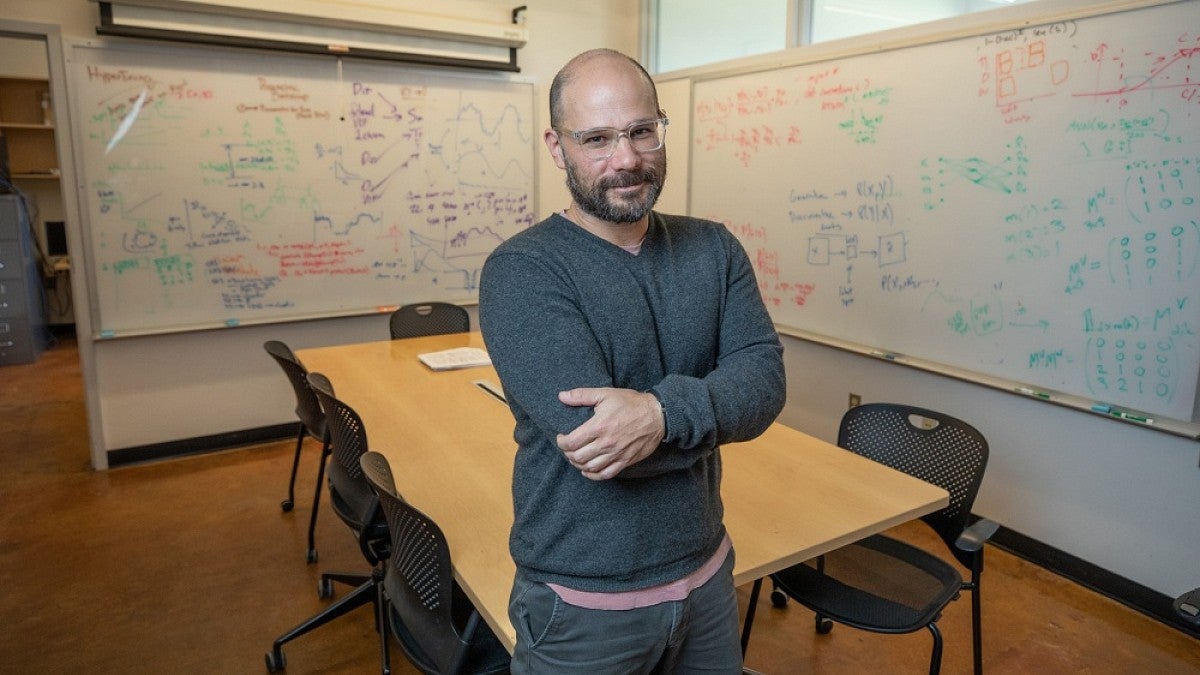Malaria is a global health crisis that affects an estimated 219 million people and kills 435,000 per year, numbers that evolutionary scientists like UO’s Andrew Kern are trying to change.
In the past, pesticides were one weapon used against mosquitos that spread the disease. But as such methods become less effective, Kern and other researchers are taking a new approach to preventing the spread of malaria by examining variation in the genomes of mosquitos.
“If we can figure out at a genetic level how mosquitos become resistant to pesticides, we can change our methods,” said Kern, a professor in the Department of Biology. “The name of the game in my research program these days is combining methodologies that come from computer science with biological problems. So what I do is very interdisciplinary.”
Kern’s three-year study, “The Population Genomics of Adaptation,” is funded by a $1.2 million grant from the National Institutes of Health and involves analyzing the genetics of tens of thousands of mosquitos in search of the genetic locus of pesticide adaption.
It’s only one aspect of what Kern does as a population geneticist. He examines how evolutionary forces create and maintain genetic variation within a population, which can include not only populations of insects but also plants, animals and, yes, humans.
As the final member to be added to the UO’s Health Promotion and Obesity Prevention Cluster, Kern is bringing a genetics perspective to the research group’s common goal of reducing the risk for obesity and promoting the health behaviors of individuals, families and communities.
“Professor Kern adds a critical element to the Health Promotion and Obesity Prevention Cluster through his work in population genetics, which can be applied broadly to all health outcomes, such as obesity,” said Beth Stormshak, a professor in the Department of Counseling Psychology and the Prevention Science Institute who is leading the cluster initiative.
The obesity prevention cluster builds upon the UO’s longstanding strengths in prevention science and biological systems It is one of five groups of scholars in the Clusters of Excellence Program, which is bringing top-flight researchers in select fields to the UO to address some of society’s most significant challenges.
Drawing on robust interdisciplinary research, the cluster and the other interdisciplinary research opportunities in the Institute of Ecology and Evolution (IE2), where Kern’s lab is based, was a key part of what attracted him to the UO from Rutgers University in 2018.
“Oregon was a really exciting opportunity in terms of having a great set of colleagues and a really interactive community,” Kern said. “It’s a great size university for getting interdisciplinary research done, there’s a ton of engaged and active faculty that are talking to one another and collaborating and that’s pretty special, actually.”
Whether it’s obesity prevention among children or stopping the spread of malaria, a common thread of Kern’s research involves taking a broader range of methodologies and bringing them to bear on new problems. His research lies at the intersection of genetics, evolutionary biology, statistics and computer science.
Kern’s interest in the field dates back to his undergraduate years at Brown University, where he earned his bachelor’s degree in biology. Initially he studied physics, but then he stumbled into a class on evolutionary biology, taught by a geneticist who merged evolution, genetics and mathematics.
“Ever since then, I’ve been on this path,” Kern said. “It’s a rapidly changing field, a total revolution. Our ability to sequence genomes has exploded over the past 10 or 15 years. So much so that we can imagine a time where every child that’s born in the United States will have its genome sequenced.”
Looking ahead toward his own research interests, Kern envisions bringing so-called “deep learning” and “machine learning” methods to bear on questions of population genetics. Such methods allow researchers to bypass more conventional statistical models, which can fail due to natural variations, in favor of machine algorithms that can parse data, learn from data and make informed decisions based on what has been learned.
Kern is part of the UO’s Data Science Initiative, where his team works on developing machine learning approaches for understanding genetic variation.
“Generally when we come up with a model, we make some modeling assumptions and nature says ‘You made all of these assumptions, but that’s not the way I work,’” Kern said. “Machine learning allows us to sidestep that, and this has been a major thrust of my own research program. By using these techniques and pushing hard on this edge, what we’re able to do is come up with more robust insights into what’s happening in nature.”
—By Piper McDaniel and Lewis Taylor, University Communications


